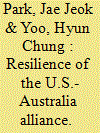| Srl | Item |
| 1 |
ID:
142085


|
|
|
|
|
| Summary/Abstract |
Despite potentially significant differences between an American superpower’s and an Australian middle power’s global and regional interests and strategies, the U.S.- Australia alliance has remained resilient. Moreover, Australia has recently been very cooperative with the U.S. deployment of its military assets on Australian soil. What lies behind this intriguing set of circumstances in alliance relations? To address this question, this article begins by providing a historical overview to show that the U.S.- Australia alliance is resilient despite the lack of a mutually perceived threat. Then, this article criticizes the argument that the U.S.-Australia alliance continues because it is insurance against potential military threats, especially against potential Chinese threats. First, the likelihood of a “fundamental” attack on the Australian homeland is very slim. Moreover, the ANZUS accord lacks a formal mechanism that triggers an automatic U.S. involvement in the way that NATO’s Article Five mandates such a U.S. response in Europe. Second, currently the American and Australian threat perceptions regarding China vary. Canberra entertains less fear of a “rising China” than does Washington. Instead, this article provides order-centric rationales for retaining and strengthening the U.S.-Australia alliance, and in that context it analyzes the recent development of the alliance’s military aspects, including the deployment of U.S. Marines in Darwin on a rotational basis.
|
|
|
|
|
|
|
|
|
|
|
|
|
|
|
|
| 2 |
ID:
187974


|
|
|
|
|
| Summary/Abstract |
This article examines the realpolitik calculations behind China’s responses to General Min Aung Hlaing’s February 2021 coup d’etat in Myanmar. By seeking to play both sides of the unrest in Myanmar, Beijing hopes to ensure that it can count on a set of regional allies to serve China’s interests. By simultaneously strengthening friendly relations with the Tatmadaw regime and the ethnic minority communities and pro-reformist movements in the country, Beijing can maintain a façade of friendship with the junta, while concurrently strengthening Beijing’s influence over Myanmar’s internal political forces. This enables Beijing to signal that it would be unwise for the Tatmadaw to step out of line away from China’s interests.
|
|
|
|
|
|
|
|
|
|
|
|
|
|
|
|